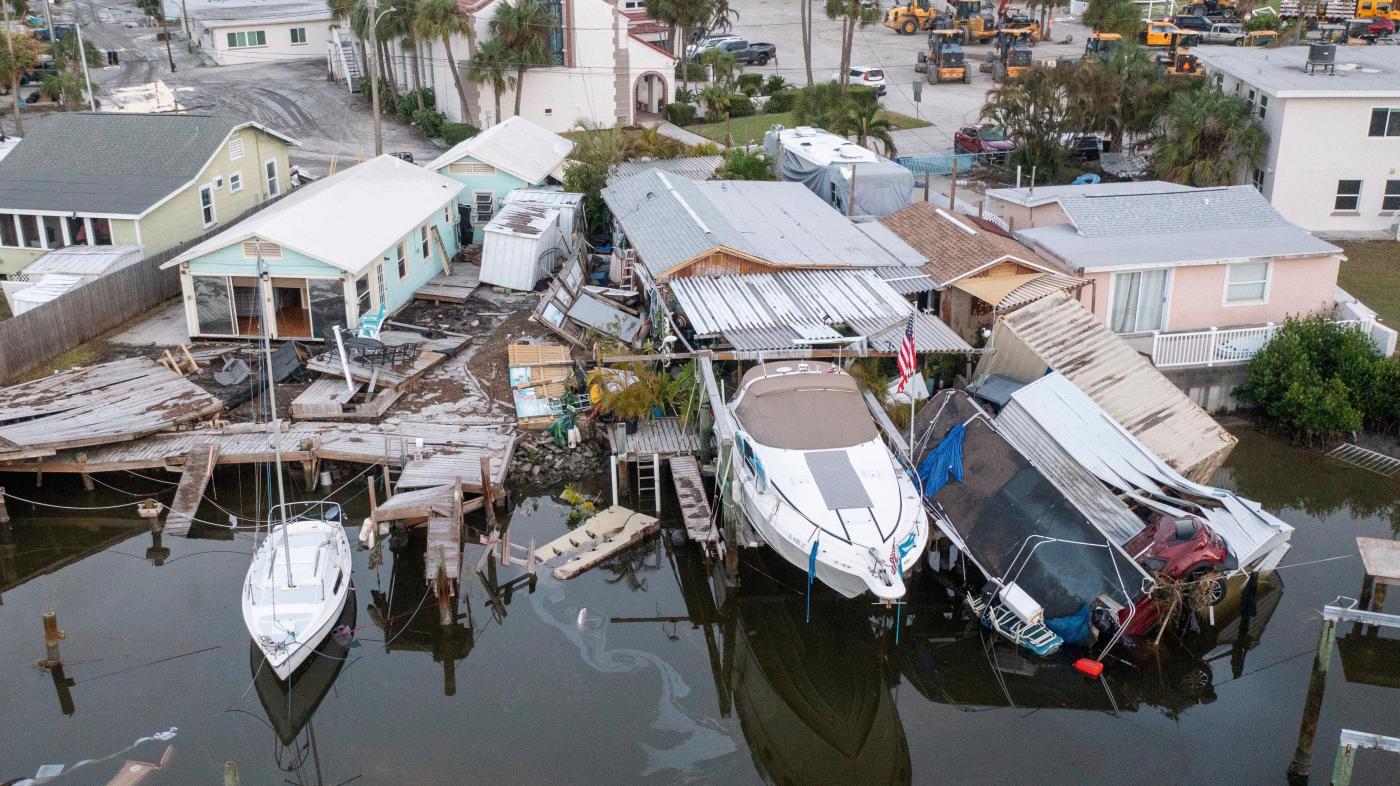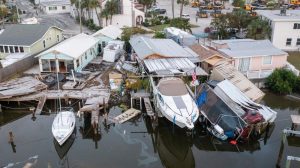
Supplies rushed to communities isolated by Helene as death toll rises to at least 107
By JEFFREY COLLINS, KATE PAYNE and PATRICK WHITTLE Associated Press
ASHEVILLE, N.C. (AP) — A crisis unfolded in western North Carolina as officials rushed to get more water, food and other supplies to flood-stricken areas without power and cellular service Monday, three days after Hurricane Helene ripped across the U.S. Southeast. The death toll from the storm reached the triple digits.
At least 107 people in six states were killed. A North Carolina county that includes the mountain city of Asheville reported 30 people killed. Georgia’s death count was raised Monday from 17 to 25.
North Carolina’s governor, Roy Cooper, predicted the toll would rise as rescuers and other emergency workers reached areas isolated by collapsed roads, failing infrastructure and widespread flooding.
Supplies were being airlifted to the region around the isolated city of Asheville. Buncombe County Manager Avril Pinder pledged that she would have food and water to the city by Monday.
“We hear you. We need food and we need water,” Pinder said on a Sunday call with reporters. “My staff has been making every request possible to the state for support and we’ve been working with every single organization that has reached out. What I promise you is that we are very close.”
Asheville’s water system was severely damaged. Residents walked with buckets to a creek to get water to flush toilets, carefully watching their steps where a wall of water three days before ripped away all of the trees and ground, leaving only mud.
Neighbors shared food and water and comforted each other. “That’s the blessing so far in this,” Sommerville Johnston said outside her home.
Officials warned that rebuilding from the widespread loss of homes and property would be lengthy and difficult. The storm upended life throughout the Southeast.
Georgia’s governor, Brian Kemp, raised that state’s death toll Monday to 25, telling reporters that the storm “literally spared no one.” Most people in and around Augusta, a city of about 200,000 people near the South Carolina border, were still without power Monday, and Kemp and other officials tried to reassure residents that they felt their misery.
Deaths also were reported in Florida, South Carolina and Virginia.
Federal Emergency Management Agency officials said Monday that hundreds of roads were closed across western North Carolina and that shelters across the area were housing more than 1,000 people.
Cooper implored residents in western North Carolina to avoid travel, both for their own safety and to keep roads clear for emergency vehicles. More than 50 search teams spread throughout the region in search of stranded people.
One rescue effort involved saving 41 people north of Asheville. Another mission focused on saving a single infant. The teams found people through both 911 calls and social media messages, North Carolina National Guard Adjutant General Todd Hunt said.
Video showed a mass of debris, including overturned pontoon boats and splintered wooden docks, covering the surface of Lake Lure, a picturesque spot tucked between the mountains outside Asheville.
President Joe Biden described the impact of the storm as “stunning” and said he would visit the area this week as long as it does not disrupt rescues or recovery work. In a brief exchange with reporters, he said the administration is giving states “everything we have” to help with their response to the storm.
Hurricane Helene roared ashore late Thursday in Florida’s Big Bend region as a Category 4 hurricane with 140 mph (225 kph) winds. A weakened Helene quickly moved through Georgia, then soaked the Carolinas and Tennessee with torrential rains that flooded creeks and rivers and strained dams.
There have been hundreds of water rescues, including in rural Unicoi County in East Tennessee, where dozens of patients and staff were plucked by helicopter from a hospital rooftop Friday.
More than 2 million homeowners and other utility customers were still without power Sunday night. South Carolina had the most outages and Gov. Henry McMaster asked for patience as crews dealt with widespread snapped power poles.
“We want people to remain calm. Help is on the way, it is just going to take time,” McMaster told reporters outside the airport in Aiken County.
Begging for help in North Carolina as that help is slow to arrive
The storm unleashed the worst flooding in a century in North Carolina. One community, Spruce Pine, was doused with over 2 feet (61 centimeters) of rain from Tuesday through Saturday.
Jessica Drye Turner in Texas had begged for someone to rescue her family members stranded on their rooftop in Asheville amid rising floodwaters. “They are watching 18-wheelers and cars floating by,” Turner wrote in an urgent Facebook post on Friday.
But in a follow-up message Saturday, Turner said help had not arrived in time to save her parents, both in their 70s, and her 6-year-old nephew. The roof collapsed and the three drowned.
“I cannot convey in words the sorrow, heartbreak and devastation my sisters and I are going through,” she wrote.
The state was sending water supplies and other items toward Buncombe County and Asheville, but mudslides blocking Interstate 40 and other highways prevented supplies from making it. The county’s own water supplies were on the other side of the Swannanoa River, away from where most of the 270,000 people in Buncombe County live, officials said.
Law enforcement was making plans to send officers to places that still had water, food or gas because of reports of arguments and threats of violence, the county sheriff said.
FEMA Administrator Deanne Criswell toured south Georgia on Sunday and planned to be in North Carolina Monday.
“It’s still very much an active search and rescue mission” in western North Carolina, Criswell said. “And we know that there’s many communities that are cut off just because of the geography” of the mountains, where damage to roads and bridges have cut off certain areas.
Biden on Saturday pledged federal government help for Helene’s “overwhelming” devastation. He also approved a disaster declaration for North Carolina, making federal funding available for affected individuals.
Storm-battered Florida digs out, residents gather for church
In Florida’s Big Bend, some lost nearly everything they own. Some churches canceled regular services Sunday while others like Faith Baptist Church in Perry opted to worship outside.
Standing water and tree debris still covers the grounds of Faith Baptist Church. The church called on parishioners to come “pray for our community” in a message posted to the congregation’s Facebook page.
“We have power. We don’t have electricity,” Immaculate Conception Catholic Church parishioner Marie Ruttinger said. “Our God has power. That’s for sure.”
Georgia Gov. Brian Kemp said Saturday that it looked “like a bomb went off” after viewing splintered homes and debris-covered highways from the air.
In eastern Georgia near the border with South Carolina, officials notified Augusta residents on Sunday morning that water service would be shut off for 24 to 48 hours because trash and debris blocked the ability to pump water.
With at least 25 killed in South Carolina, Helene was the deadliest tropical cyclone for the state since Hurricane Hugo made landfall north of Charleston in 1989, killing 35 people.
Moody’s Analytics said it expects $15 billion to $26 billion in property damage.
Climate change has exacerbated conditions that allow such storms to thrive, rapidly intensifying in warming waters and turning into powerful cyclones sometimes within hours.
Tropical Storm Kirk forms in the Atlantic and could become a powerful hurricane
Tropical Storm Kirk formed Monday in the eastern Atlantic Ocean and is expected to become a “large and powerful hurricane” by Tuesday night or Wednesday, the U.S. National Hurricane Center said. The storm was located about 700 miles (1,125 kilometers) west of the Cabo Verde Islands with maximum sustained winds of 45 mph (70 kph). There were no coastal watches or warnings in effect, and the storm system was not a threat to land.
Whittle reported from Portland, Maine, and Payne reported from Perry, Florida. Haya Panjwani in Washington, Kate Brumback in Atlanta, and Matthew Brown in Billings, Montana, contributed.


